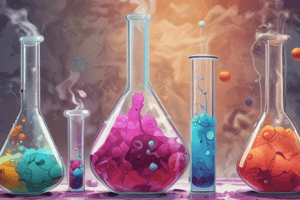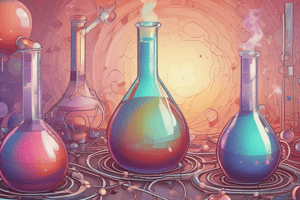Podcast
Questions and Answers
What is the general equation for a combustion reaction?
What is the general equation for a combustion reaction?
- Fuel + Oxygen → Products - Heat - Light
- Fuel + Oxygen → Products + Heat + Light (correct)
- Fuel - Oxygen → Products + Heat + Light
- Fuel × Oxygen → Products × Heat × Light
What type of reaction involves the breakdown of a single compound into two or more simpler substances?
What type of reaction involves the breakdown of a single compound into two or more simpler substances?
- Combustion Reaction
- Neutralization Reaction
- Oxidation Reaction
- Decomposition Reaction (correct)
What is the general equation for a neutralization reaction?
What is the general equation for a neutralization reaction?
- Acid - Base → Salt - Water
- Acid × Base → Salt × Water
- Acid + Base → Salt + Water (correct)
- Acid ÷ Base → Salt ÷ Water
What type of reaction involves the loss of one or more electrons by an atom, molecule, or ion?
What type of reaction involves the loss of one or more electrons by an atom, molecule, or ion?
What type of reaction involves the exchange of partners between two compounds, resulting in the formation of two new compounds?
What type of reaction involves the exchange of partners between two compounds, resulting in the formation of two new compounds?
Flashcards are hidden until you start studying
Study Notes
Types of Chemical Reactions
Combustion Reaction
- A combustion reaction is a type of chemical reaction that involves the reaction of a substance with oxygen, resulting in the release of heat and light.
- General equation: Fuel + Oxygen → Products + Heat + Light
- Examples: Burning of gasoline in a car engine, burning of wood in a fire
Decomposition Reaction
- A decomposition reaction is a type of chemical reaction in which a single compound breaks down into two or more simpler substances.
- General equation: AB → A + B
- Examples: Decomposition of hydrogen peroxide (H2O2) into water and oxygen, decomposition of calcium carbonate (CaCO3) into calcium oxide and carbon dioxide
Neutralization Reaction
- A neutralization reaction is a type of chemical reaction in which an acid and a base react to form a salt and water.
- General equation: Acid + Base → Salt + Water
- Examples: Reaction between hydrochloric acid (HCl) and sodium hydroxide (NaOH) to form sodium chloride (NaCl) and water, reaction between sulfuric acid (H2SO4) and calcium hydroxide (Ca(OH)2) to form calcium sulfate and water
Oxidation Reaction
- An oxidation reaction is a type of chemical reaction in which an atom, molecule, or ion loses one or more electrons.
- General equation: A → A+ + e-
- Examples: Rusting of iron, combustion of fuels
Displacement Reaction
- A displacement reaction is a type of chemical reaction in which an element displaces another element from a compound.
- General equation: A + BC → AC + B
- Examples: Reaction between zinc (Zn) and copper sulfate (CuSO4) to form zinc sulfate and copper, reaction between iron (Fe) and copper chloride (CuCl2) to form iron chloride and copper
Double Displacement Reaction
- A double displacement reaction is a type of chemical reaction in which two compounds exchange partners, resulting in the formation of two new compounds.
- General equation: AB + CD → AD + CB
- Examples: Reaction between sodium chloride (NaCl) and silver nitrate (AgNO3) to form sodium nitrate and silver chloride, reaction between calcium carbonate (CaCO3) and hydrochloric acid (HCl) to form calcium chloride and carbon dioxide
Types of Chemical Reactions
Combustion Reaction
- Involves the reaction of a substance with oxygen, resulting in the release of heat and light
- General equation: Fuel + Oxygen → Products + Heat + Light
- Examples: Burning of gasoline in a car engine, burning of wood in a fire
Decomposition Reaction
- A single compound breaks down into two or more simpler substances
- General equation: AB → A + B
- Examples: Decomposition of hydrogen peroxide (H2O2) into water and oxygen, decomposition of calcium carbonate (CaCO3) into calcium oxide and carbon dioxide
Neutralization Reaction
- An acid and a base react to form a salt and water
- General equation: Acid + Base → Salt + Water
- Examples: Reaction between hydrochloric acid (HCl) and sodium hydroxide (NaOH) to form sodium chloride (NaCl) and water, reaction between sulfuric acid (H2SO4) and calcium hydroxide (Ca(OH)2) to form calcium sulfate and water
Oxidation Reaction
- An atom, molecule, or ion loses one or more electrons
- General equation: A → A+ + e-
- Examples: Rusting of iron, combustion of fuels
Displacement Reaction
- An element displaces another element from a compound
- General equation: A + BC → AC + B
- Examples: Reaction between zinc (Zn) and copper sulfate (CuSO4) to form zinc sulfate and copper, reaction between iron (Fe) and copper chloride (CuCl2) to form iron chloride and copper
Double Displacement Reaction
- Two compounds exchange partners, resulting in the formation of two new compounds
- General equation: AB + CD → AD + CB
- Examples: Reaction between sodium chloride (NaCl) and silver nitrate (AgNO3) to form sodium nitrate and silver chloride, reaction between calcium carbonate (CaCO3) and hydrochloric acid (HCl) to form calcium chloride and carbon dioxide
Studying That Suits You
Use AI to generate personalized quizzes and flashcards to suit your learning preferences.




